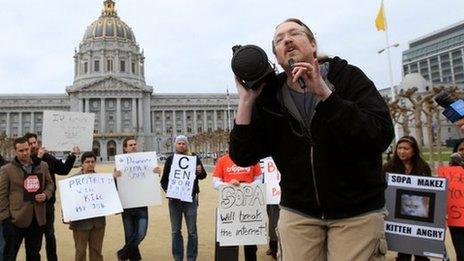Viewpoints: Anti-piracy efforts divide web users
- Published

Internet activists have protested online and on the street, such as these demonstrators in San Francisco, but the media industry has its own concerns
The past week has seen parts of the web in tumult. On Wednesday Wikipedia, WordPress and thousands of other sites took their content offline.
Webmasters offered warnings of the potential damage posed by the Stop Online Piracy Act (Sopa) and the Protect Intellectual Property Act (Pipa) - two bills being considered by members of the US Congress.
On Thursday the Department of Justice announced that it had shut down Megaupload, one of the internet's biggest file-sharing sites, and had charged several of its employees with copyright infringement.
On Friday "hacktivists" who align themselves under the name Anonymous mounted attacks against websites belonging to the US authorities, music companies and other advocates of a piracy crackdown.
The US Congress subsequently halted debate on the two bills for the time being.
The BBC asked a range of stakeholders to analyse the events and discuss what will happen next.
Geoff Taylor, BPI

The attacks by hackers on the FBI, Department of Justice and creative industry and the recent protest by tech companies against new anti-piracy laws have exposed the dirty underbelly of the internet piracy economy.
Anonymous accuse governments and the creative community of being "tyrants" for trying to prevent them stealing other people's work. This illustrates the extremism of much of the anti-copyright movement.
Not only is it morally wrong to justify taking someone else's work for nothing, it ignores the simple truth that anything of value, including entertainment, takes time and money to create. One would hope that such naive views would carry little public influence. But they have some very powerful allies.
Under the guise of fighting for their vision of an "open internet", some Silicon Valley behemoths have launched a high-profile campaign to oppose new US laws to tackle major pirate websites. As publicity stunts for this campaign, Wikipedia closed for a day and Google "censored" its doodle, asking their users to oppose the legislation.
These large corporations argue that blocking access to some mass piracy sites amounts to Chinese-style censorship of free speech and will "break the internet" - ignoring that other types of illegal sites are routinely blocked, and people will always be free to express their points of view through the millions of perfectly legal websites that don't infringe copyright.
But is the tech community's opposition to tackling piracy motivated by principle - or by profit?
Many consumers see digital theft as a kind of victimless crime - musicians and film stars have loads of money, right?
In fact, most musicians earn less than the national average income and everyone who works in the creative sector, from roadies to mastering engineers, is negatively affected by piracy. But the money that downloaders save by taking music, films and books for nothing is flowing silently into the pockets of large tech corporations.
Online hosting services pay users to upload the most popular files and charge freeloaders for faster downloads.
Search giants earn billions from online advertising, with searches for illegal free music and films a major driver of traffic.
Broadband providers charge users for all the extra bandwidth they consume downloading stuff for free.
The internet advertising industry earns commission from the ads on pirate sites, and brands reach a huge audience cheaply.
This is the hidden internet piracy economy.
Most of the internet companies that benefit from this routinely claim that they don't support piracy. They may well be sincere. Yet they consistently oppose every new measure to tackle it, and offer up no effective alternatives of their own.
Long term, this cannot be the way forward.
Apple's former chief executive, the late Steve Jobs, understood that the creative and technology industries should be partners, and that consumers benefit from better quality services as a result. Spotify and others have taken up the mantle and there are new examples to welcome, with Google and some ISPs launching their own digital music services.
But if we want a digital economy that works, the big players on the internet need to kick their addiction to the money flowing from piracy. Like Steve Jobs, they need to show that they value other people's creativity as well as their own.
Geoff Taylor is chief executive of the BPI - the trade body that represents the British recording industry.
Ernesto, Torrentfreak.com

Aside from increasing liability for many legitimate tech companies, the problem with the pending Sopa and Pipa bills is that they might achieve next to nothing in stopping piracy.
It may become easier to take out what the entertainment industry calls "rogue sites" dedicated to copyright infringement, but the recent past has shown that for every service that gets shut down, a dozen new ones appear.
Ten years ago the major threat was said to come from Napster, a few years later it was Limewire, and today it is Megaupload.
All these services are now offline but there are no signs that file-sharing is declining, on the contrary.
Instead of aggressively attempting to legislate piracy away and alienating consumers, a much better approach is to take a good look at why many people share copyrighted material.
To a great extent piracy can be interpreted as a marketing signal. Consumers see a mismatch between the offerings of the big media companies and their demands.
When the MP3-player (and iPod) first came along there was no way for people in some countries to legally buy songs to put on them.
The demand was huge but big media wasn't serving it. We still see a mismatch today, and it's one of the main motivations for people to pirate.
Piracy will always remain, but if the entertainment industries are smart enough they'll eventually deliver services that make unauthorised downloading obsolete for most people.
In Europe, for example, many people don't want to wait years before their favourite US shows air on TV, so they use file-sharing sites instead.
This is more about availability than the fact that these shows are free. The same is true for movies and music.
What the public wants is better services and increased availability at a fair price.
Ernesto is the Netherlands-based co-editor of the blog Torrentfreak.com. He asked to withhold his full identity and photograph.
Neelie Kroes, European Commission

I've said that we have to safeguard the benefits of an open internet and that Sopa is not the model for Europe. What we need instead is laws that are effective, proportionate and preserve the open internet we cherish.
Or, as I put it on Twitter, speeding is illegal but you don't stop it by putting speed bumps on the motorway.
In the digital age, our current copyright system is not succeeding in its objectives. I agree we should fight against piracy. But it's becoming increasingly hard to legally enforce copyright, and enforcement is only one side of the coin.
On top of that virtually all artists are earning under £800 a month from copyright. That's pretty devastating, for the artists themselves and for Europe as a whole.
There are lots of potential ideas out there for new systems of recognition and reward - but too often they are killed stone dead by rigid, pre-digital legislation.
Meanwhile legislation can discriminate against innovative forms of distribution - for example, e-books don't benefit from the same VAT reduced rates as "physical" books.
Overall, I have been clear that we need to go back to basics and put artists back at the centre of copyright law.
We need to ensure internet access is as widespread as possible. And we need to deal with piracy from both angles. Piracy won't be minimised until the amount of legally available content is increased.
Neelie Kroes is the vice president of the European Commission and is responsible for issues relating to the Digital Agenda
Prof William Dutton, University of Oxford

The worldwide diffusion of the internet is one of the most promising technological developments of the 21st Century. Over two billion people already use the internet and that number is set to grow as more people in the rapidly developing nations come online. There are already more Chinese users than there are Americans on the planet.
It is a core infrastructure for economic development in developed and rapidly developing nations alike, and is enabling networked individuals to hold governments and other institutions accountable in ways that are as powerful as the press in earlier eras.
However, the vitality of the internet, web and related technologies is being placed at risk by an ideologically blinkered stand-off between two single-issue groups - one seeking to protect copyright versus another protecting freedom of expression.
The internet and web grew out of a culture of sharing and free expression within academic communities, and more than 40 years on from the invention of the internet, many users remain supportive of online freedom of expression. Given the high levels of support for this underlying culture it should not be surprising that threats to freedom of expression have created major counter-reactions.
Legislative routes to protecting copyright would have a chilling effect on the internet, as they would usher in greater surveillance and governmental sanctioning of the blocking of content as well as the disconnection of users. That is why Wikipedia, Google and other responsible stakeholders in the internet have protested Sopa and Pipa.
At the very moment that protests over these legislative actions appeared to be gaining ground among US elected officials, the Department of Justice raised the stakes by taking the domain names of the Megaupload file-sharing site offline and charging its founders with violating piracy laws.
As a result the internet "hacktivist" group, Anonymous, launched its denial of service attacks. The actions of nearly every stakeholder in this conflict have been seriously uncompromising.
In the short run, it is time to talk and to stop these flame wars. Each side has failed to be open to discussion, but that is exactly what is needed. In the long term, the creative industries must focus on new business models that are sustainable in the digital era. Government can help support the research and development to enable these innovations.
More generally, all stakeholders need to understand that freedom of expression and copyright cannot be pursued as single issues. Both are part of a larger ecology of policies that have major interactions.
It is tempting to say that freedom of expression trumps all other values and interests, but the evidence is right before us that freedom of expression is being eroded by copyright, liability, privacy and data protection, public safety and other concerns. Single-issue political posturing could undermine the internet's future.
William Dutton is professor of internet studies at the Oxford Internet Institute
Neil Roiter, Corero Network Security
.jpg)
Ideologically based attacks are now a fact of life. Organisations have to prepare for them and be ready to respond.
The distributed denial of service (DDoS) attacks launched by Anonymous in the wake of the Megaupload takedown are not a surprise: these attacks are becoming the rule, rather than the exception.
Ideologically motivated groups, or "hacktivists", launch these DDoS attacks, in particular, at any time and for whatever rationale. We've just witnessed ideologically motivated attackers in the Middle East take down the Tel Aviv Stock Exchange and El Al Airlines sites.
Expect to see more of these types of attack. Some will be nuisances, while others will cause substantial damage by disrupting commerce, the flow of information and/or access to critical online services.
DDoS attacks are well within the means of any number of groups or individuals.
In this instance, we are seeing groups like Anonymous, which took credit for the attacks in the wake of the Megaupload takedown and arrests, enlist participants through the simple act of clicking on a link.
The fact is anyone can rent an army of compromised computers, also known as botnets, for some £60 and launch an attack that floods an organisation with false messages and brings a website to a halt. And the sophistication of attack methods is only increasing and becoming more difficult to detect. Organisations need to be vigilant.
Organisations such as the ones that have been targeted in these attacks should never be taken off-guard. Government agencies are by definition on the front line.
For example, industry groups such as the Recording Industry Association of America, the Motion Picture Association of America and the entertainment companies that have led the charge to suppress digital copyright infringement for years are in the crosshairs and likely calling fire down onto their foxholes.
Organisations and agencies can do a lot more than simply weather the storm. They must have corporate security policies, processes and technologies in place to detect, respond and mitigate.
These technologies include working with their ISPs to increase bandwidth to absorb DDoS flooding attacks; subscribing to services that can reroute some types of attack traffic or "scrub" traffic clean; and deploying on-premises appliances that are effective against all types of denial-of-service attacks.
Hacktivist attacks are a real and, we can expect, enduring threat for the foreseeable future. Every organisation is a potential target based on their actions, their corporate philosophy or simply who they are. They must protect themselves accordingly.
Neil Roiter is director of research at Corero Network Security
- Published8 March 2012
- Published8 March 2012
- Published20 January 2012